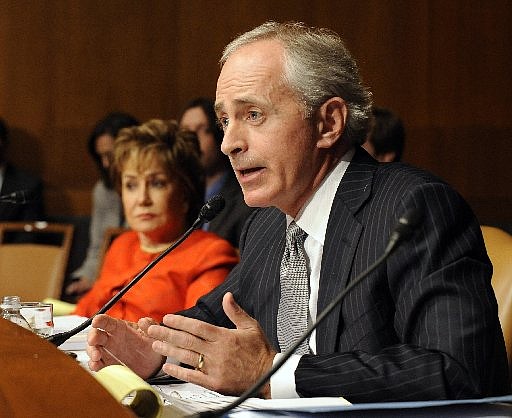U.S. Sen. Bob Corker, R-Tenn.., said Wednesday he believes Senate negotiators are close to a bipartisan agreement over a new set of financial industry regulations.
But proposals for federal controls over non-bank lenders continue to spark debate between payday lenders such as Check-Into-Cash Inc., in Cleveland, Tenn., and critics of the $6.5 billion-a-year payday lending industry.
Mr. Corker, the Republican point man in Senate negotiations for new financial industry rules, said he is working with Senate Banking Committee Chairman Christopher Dodd, D-Conn., on "a very good middle-of-the-road bill" for financial regulatory reform.
PDF: Allan Jones letter
"It's been a marathon now for almost four weeks, but I think we're going to get there," Mr. Corker said of his month-long talks to reach a compromise plan.
The New York Times reported Wednesday that Mr. Corker, who has been supported by payday lenders, pressed Sen. Dodd into limit the authority of any new consumer protection agency to directly regulate payday lenders, debt collectors and other non-bank financial companies. Enforcement of any new consumer rules will remain with existing regulators, which are primarily at the state level for payday lenders.
"There are appropriate checks and balances in the rule-making which everyone has now agreed upon," Mr. Corker said.
capping interest rates
U.S. Sen. Richard Durbin, D-Ill., is pushing a separate measure to cap the interest rate for payday loans to no more than an annual rate of 36 percent.
Advocates for such interest rate caps, such as the Center for Responsible Lending, claim borrowers often get stuck in a cycle of debt by having to pay premium rates to borrow money.
"Payday lenders are legalized loan sharks who prey upon those in need," said Kathleen Day, a spokeswoman for the Center for Responsible Lending.
But payday industry leaders such as Cleveland, Tenn., businessman W. Allan Jones said the proposed cap on interest rates would destroy an industry that helps millions of Americans get short-term loans during financial emergencies and "hasn't taken a penny in any government bailout money.
"Our critics are attempting to capitalize of fears and misinformation generated from the recent credit crisis to further their agendas of total federal control," Mr. Jones said. "Small microloans of $200 didn't cause the nation's financial crisis, yet the industry is criticized by those who did the damage."
short-term borrowing
Payday loans usually provide $200 to $400 in unsecured loans that borrowers promise to repay out of their next paychecks. Payday loans usually are priced at a fixed dollar fee. At Check Into Cash in Tennessee, for instance, borrowers pay $15 per $100 borrowed.
The effective annual percentage rate on such loans is 421 percent. But Mr. Jones insists the APR is misleading "since most of these loans are repaid in a couple of weeks" and help consumers avoid even costlier charges for bank overdrafts or late payment fees.
In its annual report released this week, Advance America Cash Advance -- the nation's biggest payday lender -- warned that proposed financial regulations could hurt, or even possibly destroy, its business.
"Any federal law that would impose a national 36 percent APR (annual percentage rate) limit on our services, if enacted, would likely eliminate our ability to continue our current operations," Advance America warned in its Securities and Exchange filing.
Steven Schlein, a spokesman for the payday industry's lobbying group -- the Community Financial Services Association -- said the industry usually makes only a couple of dollars profit on each loan.
"Profits average only about $20,000 a store (annually), so any mandated significant change to our business model would put the industry out of business, and where will consumers go for this type of short-term credit?" he said.
Payday lenders have reduced or withdrawn operations in states such as Arizona, Georgia and Ohio where stricter controls were imposed on payday loan rates.
payday campaign
BY THE NUMBERS* $400 billion -- Total value of loans made by payday lenders in 2009* $6.5 billion -- Loan commissions on payday loans in 2009* 77,000 -- Number of employees at payday lenders* 22,000 -- Number of storefront payday lenders in 34 statesSource: Community Financial Services Association
Payday lenders also are regulated by the Federal Trade Commission for loan disclosure and advertising. But faced with the prospect of a federal consumer agency regulating such loans, the payday lending industry tripled its campaign contributions and lobbying efforts from 2005 to 2008, according to Citizens for Responsibility and Ethics in Washington. The nonpartisan group, and related records at Opensecrets.org., show that Mr. Corker received at least $31,000 for his campaigns from Mr. Jones and others at Check-Into-Cash and another $6,500 in the past two years from Advance America's founder, George D. Johnson Jr.
But Mr. Jones said he hasn't talked with Mr. Corker about any payday lending issues in more than a year. Mr. Corker denied that contributions from payday lenders have influenced his efforts on financial reform.
Mr. Corker, once a director for a SunTrust Bank affiliate, also has received campaign contributions from a number of banks that are pushing for more regulations of nonbank identities, he said.
Click here to vote in our daily online poll: Do payday lenders need more government oversight?
Continue reading by following this link to a related story:
